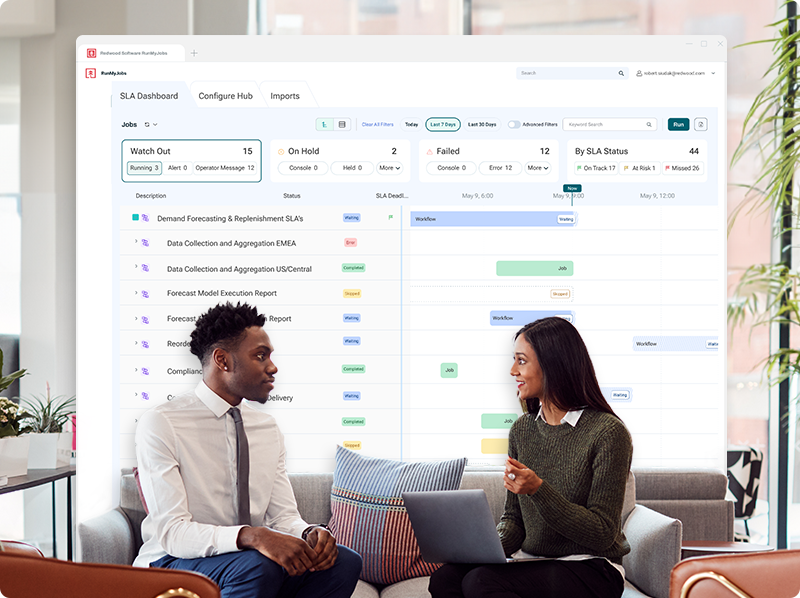Critical data management automation
Connect data management systems and processes cross-functionally to deliver the accuracy, efficiency and insights you need to make better business decisions.

Gain end-to-end control over your business data
Safeguard your organization’s data quality, build data movement into end-to-end business processes and confidently meet compliance requirements.
-
Modular automation design
Use RunMyJobs by Redwood’s reusable objects and templates to speed up automated workflow development, experience fewer errors and achieve better scalability. -
Comprehensive connectivity
Build the data ecosystem you need with out-of-the-box integrations and a limitless extensible framework to connect your data sources and data management tools. -
Vital data security
Rest easy knowing RunMyJobs protects your data with best-in-class security policies, fully encrypted communications and certified adherence to strict compliance standards. -
Consistent data processing
RunMyJobs provides centralized monitoring and reliable reporting across data pipelines, plus 99.95% SaaS uptime, to deliver the performance you expect.

Operationalize your data warehouse management
To maintain compliance and have confidence in your ability to scale, you must strengthen your data architecture and warehousing practices. With workload automation, you can efficiently manage new systems, higher data volumes and different types of data without proportional increases in manual effort.
Using low-code/no-code automation design, your team can streamline workflow creation and build in data transformation, cleansing and validation to improve your access to high-quality data.
RunMyJobs allows for end-to-end enterprise data management to ensure your data warehouse processes comply with regulations and security policies.

Refine your data flows
Manual, siloed approaches to data management result in high rates of error, which can significantly impact your ability to make data-driven decisions.
The solution is to architect data pipelines using a common set of reusable automation components and configurations and scale those automations easily with a reliable data orchestration architecture.
RunMyJobs provides this flexibility and ease of use, integrating your data sources and other data management platforms to create seamless data flows that generate datasets you can trust.

Keep your data visible and safe
Without a clear view of entire data pipelines, you can’t be 100% sure your data is secure and compliant, which means you could be unknowingly violating data privacy regulations.
A centralized data management solution with dashboards and alerts provides essential visibility to keep your team informed and in control.
Because RunMyJobs offers real-time auditing and logging, plus superior error handling, it enables quick automatic recovery and gives your team the opportunity to act in time to secure or save precious customer data or data assets in the event of serious failure.

Tackle big data with ease
Processing large volumes of data quickly and accurately poses a significant challenge for the unprepared enterprise. To migrate big data across different platforms, apps and environments while maintaining its integrity and quality, you must have advanced workload automation in place.
RunMyJobs is built to help you manage complex big data with the same user-friendly, composable automation tools you would use for smaller data loads. Whether you’re dealing with structured or unstructured data in batches or streams, you’ll have the flexibility to consistently orchestrate your data movement from IoT devices and other data sources to target systems, such as data lakes, regardless of volume.

Simplify ETL processes
The value of your data lies in its usability. An effective data management strategy includes solutions for every step, from integration to visualization.
Automate raw data extraction, transformation and loading to improve data analytics, business intelligence and decision-making.
RunMyJobs integrates with data management technologies, including ETL tools, data warehousing and analytics and a broad range of business solutions for end-to-end data automation.

SAP-compatible data management software
Already an SAP user? Redwood Software solutions are the best choice for workload automation.
Redwood has a two-decade-long relationship with SAP and the most SAP certifications of any job scheduler. RunMyJobs supports clean core principles with pre-built SAP templates and connectors to integrate seamlessly with SAP ECC, SAP S/4HANA, SAP Datasphere and more.
Achieve autonomous execution of your data management tasks and scalable access to your mission-critical business data from your SAP and non-SAP
Enterprises realize secure data management
Read real-world customer experiences of using workload automation to establish data management best practices.
Data management FAQs
What is data management automation?
Data management automation refers to the use of automated tools and technologies to handle and streamline data management tasks to reduce the need for manual intervention. It involves automating repetitive and time-consuming processes, such as data collection, cleansing, transformation, storage and movement.
With automation, you can ensure your data is processed efficiently, accurately and consistently. It helps improve data quality, governance and compliance by establishing automated workflows, monitoring systems and error-checking mechanisms. Automation can ensure that data coming from various sources gets validated, standardized and transformed before being moved to the appropriate data storage system.
Today, data management automation moves data securely, quickly and accurately across all types of IT environments, including on-premises, hybrid and cloud systems. Many organizations are starting to incorporate machine learning and artificial intelligence to drive predictive data science and facilitate easier data analysis.
What are the different types of data management?
Each type of data management focuses on a specific aspect of handling data throughout its lifecycle. These types include:
- Data governance: Establishing policies and procedures for managing data to maintain compliance and protect data quality, security and privacy
- Data storage management: The management of physical and cloud storage systems, including databases, to store data efficiently and securely in data lakes, data warehouses or other target systems
- Data integration: Combining data from different sources using tools like extract, transform, load (ETL) and APIs to maintain consistency across an organization
- Data security management: Ensuring the privacy and security of data with encryption, access control, data protection compliance and more
- Data quality management: Keeping data accurate, consistent and reliable with processes such as data cleansing, validation and enrichment
- Master Data Management (MDM): Creating a single source of truth for important business data across all functions
- Metadata management: Tracking data lineage, origin and context to make it easier to manage and retrieve data
- Data Lifecycle Management (DLM): Managing data from its creation to its archival or deletion by handling retention, usage and disposal over time
Read more about the importance of data management and movement and ensuring data accessibility.
What is data management?
Data management is the process of collecting, storing, organizing, protecting and using data in a way that meets an organization’s operational and strategic needs. It encompasses a broad set of practices and technologies aimed at ensuring data is available, reliable, secure and easily accessible to authorized users.
Effective data management enables organizations to make informed decisions based on accurate and timely data. Data analytics can’t drive business value without the core components of data management being aligned:
- Data collection
- Data storage
- Data organization
- Data security
- Data quality
- Data accessibility
Read more about how automated data management drives a competitive advantage with customer experience (CX).


